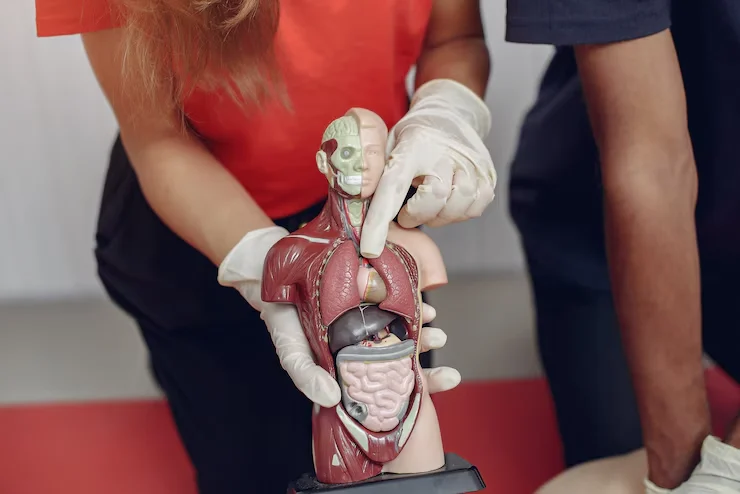Hernia Treatment: Surgery Vs. Non-Surgical Methods – What’s Best For You?
Category: General Surgery
Understanding Hernia: Causes and Symptoms
A hernia occurs when an organ or fatty tissue pushes through a weak spot in the surrounding muscle or connective tissue. Common types include inguinal, femoral, umbilical, and hiatal hernias. Symptoms range from a visible bulge, pain or discomfort, and digestive issues (in case of hiatal hernia), to more severe complications like strangulation.
Hernia Treatment Options: Surgical Vs. Non-Surgical
When diagnosed with a hernia, choosing the right treatment approach is essential. There are two main options: surgical and non-surgical methods. Let’s explore both to determine what might be best for you.
Non-Surgical Treatment Methods
Non-surgical management focuses on symptom relief and preventing further complications, mainly suitable for small, asymptomatic, or minimally symptomatic hernias.
1. Lifestyle Modifications
- Weight Management: Excess weight increases abdominal pressure, exacerbating hernias. Losing weight can help ease symptoms.
- Dietary Changes: Avoiding heavy meals, acidic foods, and carbonated drinks can alleviate discomfort, especially for hiatal hernias.
- Exercise: Strengthening core muscles without straining the affected area can prevent worsening of the condition.
2. Supportive Devices
Hernia belts or trusses may provide temporary relief by preventing hernia protrusion. However, they are not a permanent solution and should be used under medical supervision.
3. Medications
For acid reflux-related hiatal hernias, antacids, proton pump inhibitors, and H2 blockers can help manage symptoms. Pain relievers may be prescribed for temporary relief in other hernia types.
Surgical Treatment Methods
Surgery is often recommended for larger hernias or when complications arise. There are two primary surgical techniques:
1. Open Surgery
A traditional approach where a single large incision is made to push the hernia back into place, followed by reinforcement with stitches or a mesh.
2. Laparoscopic Surgery
A minimally invasive method using small incisions and a camera-guided instrument to repair the hernia. This technique results in shorter recovery time, reduced pain, and lower risk of infection.
When is Surgery Necessary?
Surgery is recommended when:
- The hernia causes significant pain or discomfort.
- There is a risk of strangulation (when blood supply is cut off to the trapped tissue).
- The hernia grows larger over time.
- Non-surgical methods fail to provide relief.
Choosing the Right Treatment: Factors to Consider
- Severity of Symptoms: Persistent pain or complications often require surgical intervention.
- Type and Size of Hernia: Small, reducible hernias may be managed conservatively, whereas larger ones need surgery.
- Overall Health: Patients with underlying conditions might need a non-surgical approach initially.
- Doctor’s Recommendation: A healthcare professional can guide you based on your medical history and condition severity.
Recovery and Post-Treatment Care
- For Non-Surgical Treatment: Regular monitoring, dietary adjustments, and physical activity can help manage symptoms.
- After Surgery: Most patients resume light activities within a week. Full recovery takes 4-6 weeks. Avoid heavy lifting and follow your doctor’s guidelines for optimal healing.
Conclusion
Deciding between surgery and non-surgical treatments depends on your hernia type, severity, and personal health considerations. While mild cases can be managed conservatively, surgery remains the most effective long-term solution for symptomatic or complicated hernias. Always consult with a specialist at Lokmanya Hospitals for the best course of action tailored to your condition.
FAQs
1. Can a hernia heal on its own?
No, hernias do not heal without medical intervention. Non-surgical methods can manage symptoms, but surgery is the only definitive cure.
2. How do I know if I need surgery?
If your hernia is growing, causing pain, or has complications like obstruction or strangulation, surgery is the best option.
3. What happens if a hernia is left untreated?
Untreated hernias can lead to severe complications, including strangulation, which requires emergency surgery.
4. Is laparoscopic surgery better than open surgery?
Laparoscopic surgery offers a faster recovery and less postoperative pain, but the best approach depends on the hernia type and patient’s condition.
5. Can I exercise with a hernia?
Yes, but only light exercises that do not strain the affected area. Always consult a doctor before starting any physical activity.
6. Will my hernia come back after surgery?
Recurrence is rare but possible, especially if post-surgery guidelines, such as weight management and avoiding heavy lifting, are not followed.
7. How long does it take to recover from hernia surgery?
Recovery varies, but most patients resume daily activities in 1-2 weeks and strenuous activities in 4-6 weeks.







